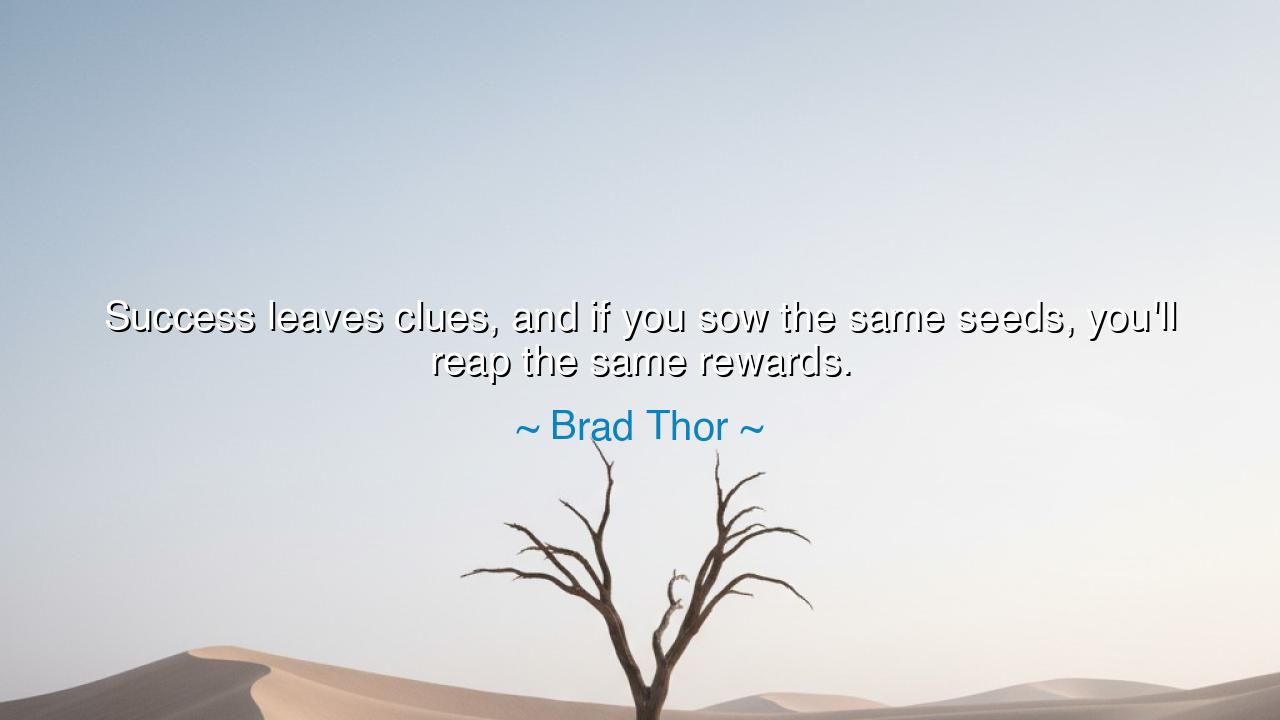
Success leaves clues, and if you sow the same seeds, you'll reap






When Brad Thor declared, “Success leaves clues, and if you sow the same seeds, you’ll reap the same rewards,” he clothed an ancient truth in modern words. He reminded us that greatness is not born from mystery or chance, but from patterns of thought and action that can be studied, learned, and repeated. Just as the farmer learns that the earth will yield to him if he sows faithfully in its season, so too can men and women learn that success is not an accident, but the harvest of deliberate labor and wise imitation.
The ancients themselves lived by this principle. In the schools of Athens, young disciples sat at the feet of their masters, not to invent wisdom from nothing, but to study the habits and disciplines of those who had walked before them. A pupil of Socrates, by listening carefully, could gather the clues to wisdom and virtue, and by sowing those same seeds in his own soul, he too might reap a harvest of insight. This is the law of the ages: those who wish to rise need only trace the footprints left by those who climbed before them.
History gives us many proofs. Consider the rise of Alexander the Great. As a youth, he studied under Aristotle, watching and learning from the lives of past heroes and kings. He did not merely dream of empire; he studied the patterns of conquest, the habits of leadership, the tactics of war. By sowing the same seeds as those who had ruled before him, yet tending them with his own fierce discipline, he reaped rewards that surpassed even his teachers’ visions. His greatness was not luck—it was the echo of principles already proven, planted in fertile soil.
Yet Thor’s words also carry a hidden challenge: if success leaves clues, then so does failure. To sow seeds of laziness, arrogance, or neglect is to reap weeds, ruin, and emptiness. The soil of life is impartial—it yields only what is planted. The man who envies another’s harvest but refuses to labor as that man did will never taste the same fruit. This is the justice of the universe: that the rewards always mirror the seeds.
There is also a heroic encouragement here. Many despair, believing that greatness is reserved for a chosen few, touched by fate. But Thor reminds us that success leaves behind a trail. The deeds, the habits, the disciplines of the great are not hidden—they are visible to all who care to look. The warrior sharpens his blade daily, the scholar studies long into the night, the artist labors until his fingers bleed. These are the clues, scattered like bread crumbs through history. To follow them is not easy, but it is possible.
The lesson for us is clear: do not wait for fortune to smile upon you. Seek out the clues left by those who inspire you—study their habits, learn their rituals, imitate their discipline. If you desire wisdom, read as the wise once read. If you desire wealth, labor as the industrious once labored. If you desire mastery, practice as the masters once practiced. The path has been marked; the seeds have been shown. It is for you to sow them.
Practically, this means finding models in life—mentors, books, examples of excellence—and tracing their steps with humility and persistence. Ask yourself: what seeds did this person plant to gain such a harvest? Then plant them in your own field. Water them with patience, shield them with perseverance, and wait for the appointed season. In time, your field too will bear fruit.
Thus, Brad Thor’s words resound like an oracle of old: success leaves clues. The world is not without guidance, nor is destiny blind. All around you, there are seeds proven by the hands of the great. Sow them with courage, reap them with gratitude, and one day, you too shall leave your own clues, a harvest of wisdom for generations to follow.






AAdministratorAdministrator
Welcome, honored guests. Please leave a comment, we will respond soon